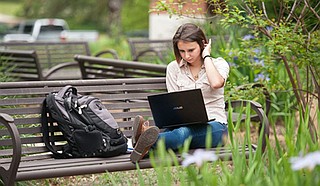Friday, August 13, 2021
Two departments in Mississippi State University’s College of Forest Resources are adding new online master’s degrees, making online degree options available in all three of the college's departments. Photo courtesy MSU
Two departments in Mississippi State University’s College of Forest Resources are adding new online master’s degrees, making online degree options available in all three of the college's departments.
The new master’s degrees are for sustainable bioproducts or wildlife, fisheries and aquaculture conservation education. The MSU Center for Distance Education also offers a master's degree in forestry, which covers forest management, natural resource policy and law and forest economics.
MSU's master’s degree in sustainable bioproducts is a 30-hour, non-thesis program covering forest products and other bio-based building materials. The courses promote the responsible use of renewable resources through the development, innovation and improvement of wood products, materials and energy, a release from MSU says.
The master’s degree in conservation education is a 30-hour, non-thesis program that covers conservation, environmental literacy and stewardship, with a focus on educational program development, evaluation and leadership.
For more information, visit online.msstate.edu or cfr.msstate.edu.
MSU Establishes Research Lab for Pediatric Feeding Disorders
Mississippi State University's Department of Counseling, Educational Psychology and Foundations recently established a new laboratory to research pediatric feeding disorders, with the goal of learning best practices to help children and adolescents ages 2 to 18 who do not eat enough. The lab's researchers are focused on developing intervention techniques rooted in applied behavior analysis to produce lasting improvement in feeding behavior, a release from MSU says.
Pediatric feeding disorders refer to children not consuming enough food or an appropriate variety of foods to meet nutritional needs or goals for various reasons. Eating disorders are usually associated with body image issues, but children with feeding disorders engage in food refusal or selectivity for other reasons, the release says. Pediatric feeding disorders are often present in children with developmental disabilities.
The lab’s first research study begins in summer 2021 and will focus on evaluating the effects of an individualized levels system for increasing the amount and variety of foods consumed. While research does indicate that this intervention has successfully decreased problem behavior, it has yet to be systematically evaluated in the context of mealtime problem behavior, the release says.
For more information, visit educ.msstate.edu or email [email protected].
USM Receives Grant Funding from Jimmy A. Payne Foundation
The University of Southern Mississippi's College of Arts and Sciences recently received grants from the Jimmy A. Payne Foundation to fund campus initiatives aimed at enhancing student success through a Sociology Peer Mentoring program and advancing the representation of Women in science, technology, engineering and mathematics fields. The funds are part of a larger grant of $571,000 through the USM Foundation.
Dr. Janet Donaldson, a professor in USM's School of Biological, Environmental, and Earth Sciences and associate dean for research and graduate education in the College of Arts and Sciences, is leading the Advancing Women in STEM initiative. The program, which aims to improve recruitment and retention of both female students and faculty at USM, received $80,000 in funding with the potential for continued funding in 2022.
The Sociology Peer Mentoring program aims to recruit two undergraduate Sociology majors to serve as mentees to facilitate student-faculty engagement for students in a General Education Curriculum service course. Mentees will foster effective study habits and behaviors, help their peers acclimate to the USM campus environment and support new students in accessing campus resources, a release from USM says. The program received $28,800 in funding over a four-year period.
For more information, visit usm.edu/arts-sciences/.
